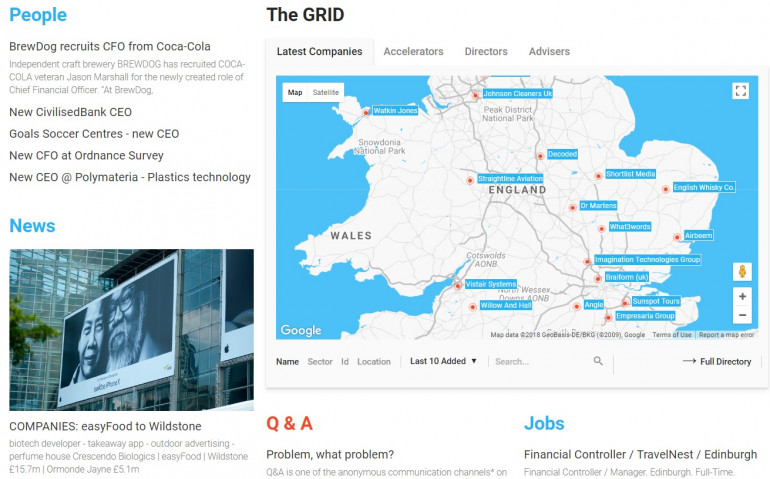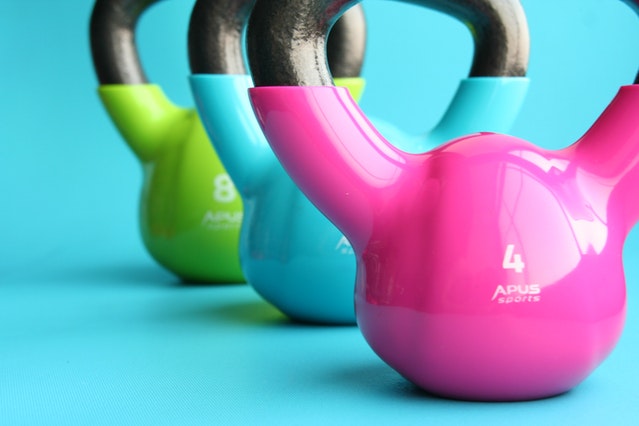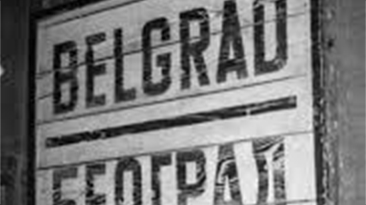Published by Directorzone Markets Ltd on December 12, 2016, 9:00 am in News, Other
Wednesday January 1st 2020

News about 9 UK growth companies and/or accelerators + turnover in the GRID marketplace, 4th – 10th December 2016:
Trainline £126m | Firefly | Doodlemaths | Veo | Ultrasound Direct £3.5m | Scalable Capital | Joules £131.3m | Kameleon £2.4m | Creo Medical
TRAINLINE: owner chuffed | Danny Fortson, The Sunday Times. December 4
DZ profile: Trainline.com Limited
Business: online seller of train tickets for train services in Europe. It sells tickets through its website, by telephone, and through its mobile app which is available on iOS, Windows Phone and Android platforms. The website has nearly 5m active customers. £1.9 billion annual sales of rail tickets make it the UK’s sixth largest online retailer.
Launched: 1999
Location: Trainline's main offices are in London, Paris and Edinburgh.
Staff: The highest-paid executive, thought to be chief executive Clare Gilmartin, took home £1m.
Financials: Interest payments on its debt mountain pushed Trainline deep into the red, eliminating its corporation tax bill. The company reported a £53m loss on turnover of £126m, its cut from the £1.9bn worth of tickets it sold last year.
Investment: KKR, the American buyout firm paid £352m for the ticket website last year, according to accounts filed this weekend at Companies House. The previous owner, British buyout firm EXPONENT, had been preparing Trainline for a float that would have valued it at up to £500m.
News: The accounts also revealed that Trainline handed £11.7m to KKR in one-off financing and deal fees. It paid another £10m to banks for arranging £205m to fund the takeover.
FIREFLY: lights the way for edtech start-ups | Emma Broomfield, The Sunday Times
DZ profile: Firefly Learning Limited
Business: a digital learning platform used by 480 schools worldwide to set homework, track progress and share resources. After a one-off fee of £2,000, schools can expect to pay from £7 a year per pupil to use it. Firefly, used by about 400,000 pupils in 32 countries, boasts a client list that includes Eton College and the British International School in Cairo. Private schools make up 59% of their roster, 26% are state-run and 15% are international. It aims to reach 750m students across the globe.
Location: offices in south London and Sydney
Founders: Joe Mathewson, 32, and Simon Hay, 30,
Staff: 50
Investment: Last month Firefly secured £4.5m funding from BGF VENTURES and BERINGEA — one of the largest investments to be raised by an early-stage edtech firm.
News:
1. The success of companies such as Firefly is fuelling the growth of education technology, or “edtech” — systems designed to support learning. It is one of the fastest-growing areas of the UK’s digital economy, accounting for 4% of all digital businesses.
2. There are close to 1,000 edtech start-ups and scale-up businesses in Britain today, according to Edtech UK, a government-backed body set up last year to help gain a greater share of a global market that is estimated to grow to £129bn by 2020.
3. Half of the 20 fastest-growing edtech companies in Europe are in the UK, and ministers have finally woken up to the sector’s potential. The first head of edtech policy and data strategy at the Department for Education, Bridie Tooher, was appointed in August.
4. British schools, which spend £900m a year on education technology, have more freedom than in countries such as America where suppliers must be approved by district authorities.
DOODLEMATHS
DZ profile: EZ Education Ltd
Business: the UK’s bestselling mathematics app, which covers national curriculum maths for 4 to 14-year-olds. Work with 300 UK schools.
Launched: 2013
Location: Bath HQ
Founders: Nicola Chilman, 39, and Tom Minor, 44, both qualified teachers
Staff: 10
VEO
DZ profile: Video Enhanced Observation Ltd
Business: educational video platform which enables users to record, tag and review learning practices. The app is free to download but access to VEO’s sharing functions is charged monthly, with prices averaging about £1 per user. Twelve universities have signed up, as well as businesses keen to streamline in-house learning.
Launched: 2013
Location: Newcastle
Founders: Paul Miller, 37, and Jon Haines, 46,
Staff: 4
Investment: secured £130,000 of investment from NORTHSTAR VENTURES last year to help them scale up to reach 100 schools across Europe, America and Singapore.
ULTRASOUND DIRECT: We realised people like to spend time with baby scans | Laura Onita, The Sunday Times
DZ profile: Ultrasound Direct Limited
Business: scans for pregnancy and a range of health issues. It runs 76 clinics, both owned and rented sites, plus seven franchises. It operates in 14 Mothercare stores. Patients can have a 10-minute scan for £39, while the most expensive prenatal screening, for Down’s syndrome, costs £399. Discount voucher websites make it difficult to stay ahead of rivals who entered the market, said Steward: “It’s a dangerous game to sell health cheaply.”
Launched: 1998
Location: Market Harborough, Leicestershire
Founders: Jan Steward, 58, a former NHS sonographer, with her husband, Mike, 57, co-founded Babybond (now Ultrasound Direct) with £150,000 of savings.
Staff: employs more than 200 sonographers
Financials: made pre-tax profits of £335,000 on sales of £3.5m in the year to September.
Investment: In 2008 they took a £100,000 investment from the EAST MIDLANDS EARLY GROWTH FUND in return for a 30% stake, and are willing to part with more equity to fund growth.
News:
1. The couple two years before opening a second site, in London, and then the business took off. Four more sites are planned next year.
2. Steward was a finalist in this year’s Forward Ladies business awards.
SCALABLE CAPITAL: Adam French, co-founder, left Goldman to develop an algorithm for matching retail investors with the right ETFs | Harriet Green, City A.M. December 5.
DZ profile: Scalable Capital Limited
Business: Scalable Capital aims to provide institutional-level investing to the retail investor. Like older firms in the space, it uses exchange-traded funds (ETFs) to invest across all major asset classes. And like others, it currently requires a £5,000 minimum investment, with an all-in fee of 0.75 per cent per annum.
Launched: 2014
Founders: Adam French, former trader, and chief executive and co-founder of digital investment management firm. French set up the German arm of his business, which operates there and in the UK, in 2014. His co-founder in Gemany, Florian Prucker, had been a colleague at Goldman.
Investment: Next year, Scalable, which has raised around £10m to date, will go for more funding.
News:
1. The Scalable team wanted to go beyond packaging and use technology to create a new product. “The traditional investment industry relies on ‘expertise’ and active management. We want to remove that. We know that technology can do so much better when it comes to money management than humans can because it’s unemotional, and millions of eventualities and processes can be simulated.”
2. Scalable has built an algorithm which aims to do just this: draw data and model a complex world without having to make simplifications or assumptions – and without layers of people and process, which add cost. The firm calculates that a £100,000 investment, with a 6 per cent return, would yield £12,716 more than a traditional investment manager. Over 30 years, that’s £93,523.
3. Rather than focus on building teams of operations or sales people, the bulk of Scalable’s 42-strong team are financial and software engineers.
As an investor, rather than be put on a risk scale – a two for taking less risk, or a seven, say, if you’re willing to take more – Scalable uses a percentage scale to ascertain how much you’re willing to lose. So if you’re at 15 per cent, that’s the hit you’d be willing to take in a really bad year. “We want to move away from relative risk to absolute risk. We run simulations on an individual portfolio basis, so even if you’re in the same risk category as someone else, your portfolios might look different. …”
4 … while robo-advisers are often treated with a degree of scepticism in the UK press, says French, Germans have been more enthusiastic. “The landscape is very different there. There’s 1,600 banks versus our 400, and no independent financial adviser (IFA) market. If you wanted investment advice you’d go into a bank and ask about the product of the month. Combined with negative interest rates and people having to pay for the privilege of sitting on their cash, robo-advisers have been welcomed as a fantastic alternative to a less developed market driven by sales, rather than advice.”
5. Manuela Rabener and Simon Miller joined French as UK co-founders, where Scalable Capital launched this year
French admits he “hates the label robo-adviser. It’s something that’s come out of the US and been put on anyone doing something that’s online and investing. But the idea that we’re providing advice is completely wrong. It’s a moniker that exists because people don’t understand that there’s a fiduciary relationship out there that’s accessible – because they’ve never seen it before. ‘Robo’ always gets attached to new technology – traffic lights were originally called ‘robo-traffic wardens’. Hopefully we’re not far off this just being called investing!”
6. While it’s deliberately focused on a fairly niche, mass-affluent market so far, it’ll press on with penetrating the UK market more widely, in addition to rolling out a Sipp (you can already open an Isa). French is also excited about B2B opportunities for the firm – i.e. selling their product to banks. We’ve already got the systems in place for white labelling, and I think we’ll see the theme of collaboration more widely develop a lot in 2017.”
JOULES: plays up ‘Britishness’ to grow sales in America | Clare Hutchison, Evening Standard. December 7
Wikipedia: Joules (clothing)
DZ profile: Joules Group Plc
Business: Fashion and lifestyle brand that sells clothing, footwear, accessories and home products inspired by British country lifestyles. Started selling clothing at outdoor events. Known for its brightly coloured wellington boots and raincoats. Originally established as Joule & Sons in 1977 by Ian Joule, his son Tom took over the family business in 1989. Has 99 retail stores throughout the UK and Joules’ products are available to buy online, via click and collect, through mail order catalogues and at wholesale stockists as well as at country shows, festivals and equestrian events. Since 2000 Joules has opened flagship stores in Norwich, Cheltenham and York as well as in market towns and coastal holiday destinations throughout Great Britain such as St. Ives, Southwold, Burnham Market and Salcombe. The high street brand is also stocked in leading UK department stores, including House of Fraser, John Lewis and Fenwicks. The brand has since expanded overseas with particularly successful sales in Germany and USA.
Launched: 1977
Location: Market Harborough, Leicestershire.
Founder: Ian Joule
Staff: Tom Joule, chief brand officer; Colin Porter, chief executive
Financials: Annual results for the 52 weeks ended 29 May 2016 – Group revenue up 12.8% to £131.3m. EBITDA: £13.5m.increased revenues by 50 per cent to £116.4m between its 2013 and 2015 fiscal years. In the year to May 2015, store, ecommerce and wholesale revenues represented 46 per cent, 22 per cent and 27 per cent of total revenue respectively.
Investment: Listed on AIM in May. Shareholders: Tom Joule 32.2%, BLACKROCK 14.6%, STANDARD LIFE 8.8%, LDC NOMINEES 7.1%, OLD MUTUAL GLOBAL INVESTORS 5.7%, VOLANTIS CAPITAL 4.1%, COLUMBIA THREADNEEDLE INVESTMENTS 3.7%. LLOYDS DEVELOPMENT CAPITAL, which bought 20 per cent in 2013, sold its holding.
News:
1. Joules said sales rose 16.2% to £81.4 million in the six weeks to November 27, partly thanks to a strong performance in the US. New stores helped lift retail sales 15.8% to £56.7 million. Wholesale revenues grew 17.2% to £24.5 million.
2. Finance boss Marc Dench said Joules was not immune to the tough High Street conditions, but its shops tended to be in holiday destinations and more resilient than traditional shopping locations.
3. Joules is not intending to raise prices next year, Dench added, despite the weakness in sterling. Joules buys 90% of its goods in dollars, but is hedged until the end of 2017.
UPDATE:
Small-cap focus: recent retail IPOs battle the downturn | Conor Sullivan, FT. August 5, 2017
4. The share price has advanced 91 per cent since the company floated in June last year. Results last week showed a healthy 20 per cent rise in revenues to £157m. Profits before tax, IPO costs and interest on shareholder loans rose 34 per cent to £10.1m in the year to May 28, and the market now values the group at £270m. ....more than a third of retail sales were made online and chief executive Colin Porter talked of an “omnichannel” strategy. This approach — now de rigueur in retail — includes services such as “click and collect”, he said.
KAMELEON: Be Heard snaps up Soho rival in bid for digital growth | Simon English, Evening Standard. December
DZ profile: Kameleon Worldwide Limited
Business: digital marketing firm whose clients include Danone, Quorn, RockCorps, Celebrity Cruises, Lee Cooper, National Citizens Service, City Index and Sony.
Launched: 2008
Location: Dryden Street, London
Founders: Mark Webster and Richard Armstrong
Financials: Last year Kameleon had revenues of £2.4m, an amount it expects to grow this year to £3.9 million.
Investment: Aim-listed BE HEARD is buying digital marketing firm Kameleon, giving the founders £4 million, of which £2.6 million is cash. There could be another £6 million in cash and shares over the next three years if earnings targets are hit.
News:
1. Advertising veteran Peter Scott’s Be Heard marketing group has snapped up a Soho rival in a deal that could net the founders £10 million.
2. Scott, who started at Ogilvy & Mather, co-founded WCRS, which later became Aegis.
3. Be Heard joined Aim in December 2014 at 6p. Today the shares were up 0.23p at 3.63p.
CREO MEDICAL: to IPO with £20m in fresh funding | Billy Bambrough, City A.M. December 8.
DZ profile: Creo Medical Limited
Business: a small biotech company specialising in surgical endoscopy which has over 75 patents granted and 150 patents pending.
Location: has a research and development site in Bath and a manufacturing facility in South Wales.
Founder: Chris Hancock, who was part of the senior engineering team at Gyrus Medical. Gyrus came to the market with a value of £42m and got bought by Olympus in 2007 for $1.4bn. There is also a number of the former Gyrus management team involved with the company.
Staff: 28. chief executive Craig Gulliford
Investment: Current investors in Creo are FINANCE WALES and HOYA PENTAX MEDICAL, a Japanese medical technology company. New investors are a range of large institutions, while the current shareholders are also reinvesting.
News:
1. Will float on the London junior market tomorrow after raising some £20m from investors. Cenkos Securities is acting as the nominated adviser and broker to Creo for the IPO.The raising, with about a fifth coming from existing backers, will be used to develop a range of surgical devices that can be used with an endoscope – a flexible tube with a light and camera that is inserted into the body.
2. Creo recently completed its first clinical study in humans and clearance from European regulators is expected in the first quarter of next year.
3. Creo is also planning on expanding over the next couple of years, launching into Europe in 2017 and the US the year after. The capital raised is expected to last the company at least two years.
4. Creo Medical is the fourth Finance Wales portfolio company to list on AIM in the last four years. Other FW portfolio companies to list on AIM, include DIURNAL, ENFIS and MEDAPHOR. Q-Chip also became MIDATECH PHARMA WALES when they were acquired by MidaTech with a concurrent AIM listing.








